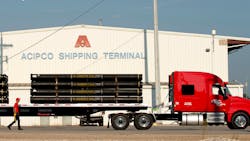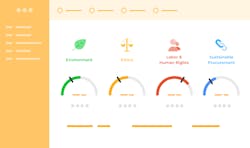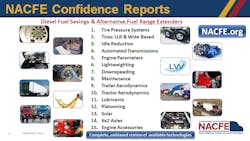Fleets try to meet shippers’ newest request: sustainability
The trucking industry has been pushed into reduced emissions requirements for years by federal regulations. But more recently, carrier customers are moving fleets toward decarbonization to keep and win business. Some fleets are figuring out how to balance shippers' desires for decarbonized deliveries with a business model that has long relied on internal combustion engines.
That's happened recently to Buddy Moore Trucking, an Alabama-based for-hire carrier and broker, when its largest customer told the fleet that "our EcoVadis score was as important as our rate per mile," said Susan Kirkpatrick, Buddy Moore Trucking's EVP and CFO. Buddy Moore is No. 212 on the FleetOwner 500: Top For-Hire Fleets of 2022 list.
Founded in 2007, EcoVadis provides business sustainability ratings for more than 100,000 companies. Those ratings are based on four sustainability categories: environment, human rights, ethics, and sustainable procurement.
See also: Small fleets turn to fleet-as-a-service provider to begin electric journey
Since first learning about EcoVadis from a shipping customer, the brokerage side of Kirkpatrick's business started working with a German company that is rated "Platinum EcoVadis," she said. "We began to realize this is really a big thing."
Sustainable procurement and alt fuels
"My grandmother raised me to be a conservationist, so I believe in taking care of the Earth—but it's so much more than that," Kirkpatrick said during a panel on sustainability and shippers during the McLeod Software 2022 User Conference in Nashville. "You start talking about sustainable procurement. Well, if you're in the trucking business, we're burning diesel fuel. But our truck-stop provider has a separate division based purely on alternative fuels. So they're going to continue to sell diesel, but they're going to do these other things."
She said she now has access to data, through her fuel provider, about how much biodiesel her drivers are buying on the road. "They are thinking that way, so it's got us thinking that not only do we need to do this to fulfill our customer's desires, but how does it make us a better company?"
See also: What does the messy middle mean?
Kirkpatrick's company is working with Auburn University, where a class on supply chains will work with the fleet this spring to prepare a sustainability report on Buddy Moore Trucking. "That's going to go through everything from the kilowatt hours of power we use in our terminals to the carbon footprint we have based on our equipment. We're just thinking it's a whole new ballgame for us."
Kirkpatrick said the fleet is just a few points from earning EcoVadis bronze status. The company is preparing to resubmit for status this fall before building off that basis with the Auburn students.
Corporate emissions worries grow
Scope 3 emissions, the emissions that companies are indirectly responsible for—such as the transportation of a company's goods—are becoming more critical in the corporate world, according to Dave Schaller, industry engagement director at the North American Council for Freight Efficiency (NACFE).
During the McLeod panel, Schaller said that the transportation contribution of emissions was highlighted even more during the COVID-19 shutdowns, when malls and stores were closed but e-commerce deliveries rose.
NACFE has been working with private and for-hire fleets to test efficiency technologies in real-world freight operations. It’s held three Run On Less demonstrations with volunteer fleets and drivers who have tested their efficiency in long-haul, regional, and electric transport.
NACFE has been working with fleets, equipment manufacturers, and government and non-government organizations to make goods movement across North America more efficient. The unbiased and fuel-agnostic nonprofit creates confidence reports for various power systems and efficiency tools to help fleets and others see the benefits and challenges of adopting different fuel-efficiency technologies.
"We track about 85 different technologies that fleets use," Schaller said. "No technology has gone from zero to 100% in less than a decade—ever. And most of them never get to 100%. They're not all right for everybody."
Schaller said when a carrier such as Buddy Moore Trucking contacts NACFE, the organization goes over the fleet's current equipment. "Susan has both flatbeds and van lines," he noted. "To me, instantly, that's two different types of trucks—your truck wants to be the same height as your trailer for aerodynamic purposes. I was very relieved when she told me they buy trucks with two different height-aero setups. So it's things like this that come into play."
"And each and every one of you, your fleets, are on a different baseline right now," he added. "And we recognize that."
Trucking efficiency technologies of today and tomorrow
Schaller said that NACFE wants to work with fleets by finding out what they are trying to accomplish and pointing them toward the resources to help achieve those goals.
"There's just a lot of good information to share out there on what you can do to improve your efficiency," Schaller explained. "A real simple one here: If you're running diesel fuel today, biodiesel is a step towards sustainability. Renewable diesel is a new, bigger step toward sustainability. If you're running [compressed natural gas], there's now a renewable natural gas.
"There are things you can do without changing your whole infrastructure," he continued. "But then on the other end of this, as we're looking at electrification and hydrogen fuel cells, we're digging deep into all those subjects—as well as autonomous trucks. So if you're interested in some of these bigger, more challenging sustainability steps, we're ready to help you investigate and start to learn."
Kirkpatrick agreed with Schaller that there is not one sustainability answer for all fleets. "For instance, with flatbeds, I don't see an electric vehicle on a job site in the middle of nowhere stringing pipe along the side of the road," she said. "But if you've got some sort of yard situation where you're using hostlers to move trailers around, that makes perfect sense."
See also: Slow and steady wins the race to zero emissions
Kirkpatrick suggested that fleets look at the fueling infrastructure in their service areas to help guide their decisions. "Our fuel truck stop vendor, their delivery trucks in the state of Texas are on CNG because the network is there, and it makes sense for them," she explained. "I think that what we all got to find is where the are the points that make sense for us—because you can't just flip a switch. It's not cost-effective to do that."
While fuels such as diesel, natural gas, hydrogen, and electricity get most of the attention, Schaller said NACFE tracks about 20 different fuel combinations in the heavy- and medium-duty trucking world.
"There are sanitation fleets out there running [dimethyl ether]," he gave as an example. "There's now renewable liquid propane—not only do we have liquid propane for school buses and lighter-duty vehicles, we've now got renewable liquid propane. So you can do something that's even more economical or environmentally friendly. Hydrogen is coming on board too."
He cited the Cummins X15H 15-liter hydrogen engine, which is part of Cummins' fuel agnostic platform. That platform has 15-liter engines—the same size engine in two of every three long-haul trucks in North America—based on the power technology OEMs, fleets, and drivers are already familiar with. With different head gaskets, Cummins can offer fleets diesel, natural gas, or hydrogen fuel options for similar engines.
Engine makers and OEMs are also testing how hydrogen can power long-haul Class 8 trucks. "There are test trucks out there that are range-extended battery-electric trucks," Schaller said. "The easiest way to describe it is you get rid of three-quarters of the batteries on the truck—get rid of all that weight and cost—and put a hydrogen tank and a hydrogen fuel cell on it. It's now a long-range electric vehicle. Vehicle tests are already getting over 300 miles per tank of hydrogen and that will only improve."
Kirkpatrick said she's paying attention to alt-fuel technology advances and speaking with truck makers about the future possibilities. But she said her fleet of more than 500 power units and 400-plus drivers is "more reactionary" right now.
"I think there are some things that may reset the playing field a little bit," Kirkpatrick said. "I'm all for clean energy—but it has to be cost-effective for us. All of us in this room that haul freight for a living, we set a certain rate per mile, and the equipment we run and the drivers we pay, we're all in the business to make money. It doesn't do any of us any good if we run vehicles that don't allow us to make money."
About the Author
Josh Fisher
Editor-in-Chief
Editor-in-Chief Josh Fisher has been with FleetOwner since 2017. He covers everything from modern fleet management to operational efficiency, artificial intelligence, autonomous trucking, alternative fuels and powertrains, regulations, and emerging transportation technology. Based in Maryland, he writes the Lane Shift Ahead column about the changing North American transportation landscape.




